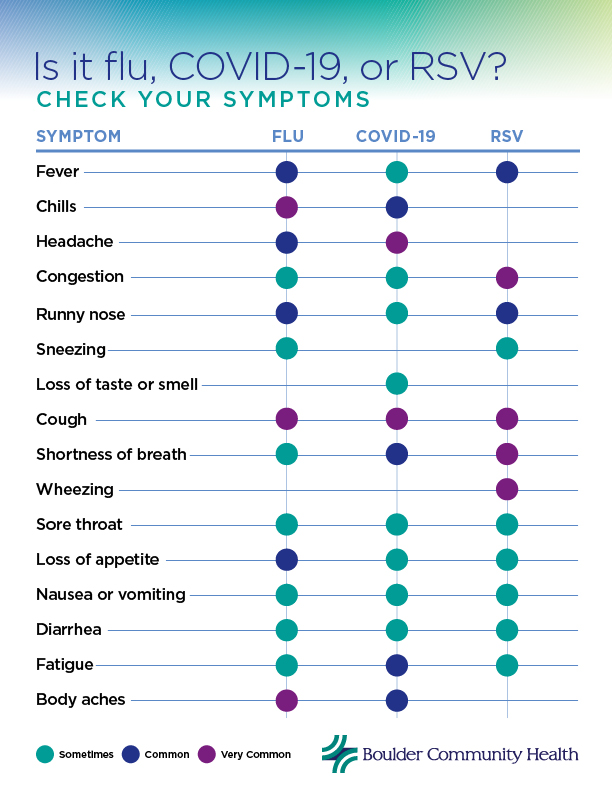Is it influenza, COVID-19 or RSV?
- Category: General, Infectious Diseases, Primary Care
- Posted On:
- Written By: Boulder Community Health

Symptoms of the three respiratory illnesses overlap
Influenza A (flu), COVID-19, and respiratory syncytial virus (RSV) are common causes of respiratory illnesses, which increase during the fall and winter months. Symptoms of these viruses significantly overlap, making it difficult to distinguish between them. (See symptom chart below.)

How we diagnose flu, COVID-19 and RSV
With such similar symptoms, there are tests to tell us whether someone has flu, COVID-19 or RSV. Testing also provides valuable insight on how long you should isolate and whether there are any antiviral treatment options. Depending on your underlying health problems, testing may be even more important and should be discussed with your primary care provider.
There are two main testing technologies:
- Molecular tests: These tests, administered at a clinic or hospital, detect the genetic material of the virus and are the most accurate (or sensitive) form of testing. They are readily available at BCH.
- Antigen tests: These detect specific viral proteins that are made during infection. This technology is used in home tests and available for flu and COVID-19. They are less sensitive than molecular tests.
If you are testing after exposure to flu, COVID-19 or RSV, you should wait 5 days or until you have symptoms.
Treatment options
How do we treat flu?
Your provider will determine if you need antiviral medication for flu, depending on your personal health, risk for severe disease, risk for complications, the potential for you to transmit the virus to someone at risk for complications, and the duration of your symptoms.
Tamiflu® is a prescription medicine used to treat flu. This antiviral medication works best when started within 1-2 days after flu symptoms begin.
How do we treat COVID-19?
If you are within five days of developing COVID-19 symptoms and are at high risk for severe disease, you may be eligible for PaxlovidTM antiviral tablets. It will lower your risk of getting so sick that you need to be hospitalized.
Determining whether you are at high risk for progression to severe COVID-19, which can lead to hospitalization or even death, is based on your medical history and your primary care provider’s assessment.
How do we treat RSV?
There are no outpatient antiviral treatments for RSV in adults. Therefore, the only way to manage symptoms is with over-the-counter medications.
What you can do for symptom relief
Many people with flu, COVID-19 or RSV relieve their symptoms by resting, drinking fluids and taking over-the-counter medications:
- Nonsteroidal anti-inflammatory drugs (NSAIDS) such as ibuprofen, naproxen sodium and aspirin
- Acetaminophen
- Decongestants
- Lozenges
- Antihistamines
- Cough suppressants
- Nasal saline
Talk to your provider about which over-the-counter medications are safe for you to use.
Do antibiotics help?
Antibiotics do not treat illnesses caused by viruses or prevent complications and should not be used. Importantly, if your symptoms persist for weeks without improvement or dramatically worsen, you should make an appointment with your primary care provider. Although rare, bacterial pneumonia and bacterial sinusitis can be complications from an initial viral illness.
If you have any questions about flu, COVID-19 or RSV, talk to your health care provider.